Leaders of major companies inevitably become famous, becoming aspirational figures beyond their domain. But that’s not the same as celebrity in the sense of public prominence way beyond what follows from doing their job: rockstar antics, glorying in attention, playful exhibitionism in social media, a sense of glamour as much as achievement. So we have Elon Musk. Looking back, we had figures like Branson and Rockefeller. I’m sure even in Roman times someone fit the bill.
Characterising charisma
Of course, it’s a spectrum, with Musk at one end and figures such as Steve Jobs and Jack Dorsey somewhere back along the line. What characterises the celebrity end of the spectrum?
- A CEO who directly addresses the public as an individual
- Unmediated personal communication displaying personality, emotion and vision
- Delight in ignoring the conventions of business decorum
- Communications combining personal and business interests
- Their personal life becomes a topic of general fascination
- Fleeting thoughts and feelings widely discussed
The consequence is an identification of the business with the personality of the CEO and a powerful anchoring of business success to that individual personality.
Is this helpful, or troubling? Is the best CEO actually the boring one who focuses 100% on the job and keeps out of the news?
Risk and reward
Charismatic leadership is fantastic for getting attention. There’s typically a perception of authenticity, a sense of the hero, the visionary. This most obviously affects the general public - powerfully driving brand visibility at no cost - but also impacts investors, building market excitement.
There’s also the internal perspective. Inspiration for the team, feeling part of something special (very powerful in the early Virgin years) creates a unified vision that aligns and cuts through the strategic muddle.
The celebrity CEO amplifies marketing efforts, drives intense brand loyalty in customers and staff, and potentially boosts market valuation.
And all news is good news, right? Well, no... Heroes can dramatically fall from grace. Mockery, moral outrage, sudden shifts of perception in response to fleeting comments. What happens when the drama swings the wrong way?
Negatives are anchored to your business just as much as positives, amplifying the business effects of misjudgements, foolish comments, and even personal life drama. When the PR is bad you have reputational damage, a growing army of social media haters, and risk sudden downswings in valuation.
From an internal perspective, employee motivation and retention can dramatically swing in response to misjudged comments on hot political topics, and at senior level, there has to be a risk of groupthink around one all-powerful personality.
The combination of personal interests, personal life and business interests can be toxic for the latter.
Heroes can dramatically fall from grace. Mockery, moral outrage, sudden shifts of perception in response to fleeting comments. What happens when the drama swings the wrong way?
Should boards care?
Celebrity leadership ramps up the risk and reward profile - everything can be amplified and can crumble to dust. You get amazing engagement for zero marketing budget, but a couple of wrong tweets and your business reputation is dented along with the CEO’s ego. Just as there are high-risk sectors and markets, there is high-risk leadership.
Thinking about this requires two kinds of nuance.
First, context. As a business, what is your risk profile? Does it make sense, given your value proposition, to trade some predictability for amplification of attention? Does it make sense, given your customer, investor and wider stakeholder profile - and perhaps national culture - for a heroic figure to define your public identity?
Second, moderation. I love visionary personalities, and I love people who blast through the formality and fakeness of so much in business. Advising a CEO - just as when mentoring my newest recruit - I’d want to hold onto that. Not diminishing their energy and colour but bringing awareness of its impact. We can all agree certain things need avoiding - extreme political views, racism, some basic risk areas around markets and trading. Does the CEO have trusted people who can perform this role? Moderating extremes without losing the personality? This is partly a legal duty but needs to go beyond that and build meaningful personal awareness.
The changing world
Let’s consider how the world is changing. The pandemic shock gives rise to a few current considerations that affect leadership:
- It’s a time of intense innovation. Accelerated trends such as abandonment of cash and the transformation of physical to digital.
- Radically changing working practices. How we motivate and empower employees has never been less clear.
- Sustainability demands returning to (and beyond) the prominence they held in 2019.
- A bored and worn-down public yearning for optimism and fun.
While it’s hard to directly connect these to CEO style it nudges the scales in favour of visionary charismatic leadership. To promote innovation, to inspire teams, to connect with people in new ways that resonate with now. While being mindful of the risks, colourful communicators are perhaps just what some businesses need in the 2020s.











